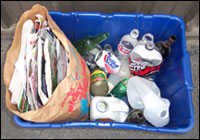Dear Umbra,
In reference to your polystyrene response: The polystyrene I have seen recently appears with a No. 6 recycling triangle on the bottom. But I’ve heard there is no market for this stuff, even though our local recycling company claims to want us to collect all Nos. 1 through 7. How can this be?
Gail
San Bruno, Calif.
Dearest Gail,
It’s a trick. Since recycling became the Next Big Thing in the 1980s, towns have been testing all sorts of rules, collection bins, and guidelines to see which work best. Some places commingle everything: Glass, plastic, and paper all get dumped in one container. Other places have three separate containers. Some places recycle all bottles, some recycle all containers, some recycle all plastics, some recycle only No. 1s and No. 2s.

Bin there, done that.
Photo: Waukesha County Recycling.
The inconsistency is partially due to variations in markets for recycled materials and the funding available for recycling programs. Cities also need to get those recycling rates up, either to meet goals they’ve set or to make ends meet.
Your municipality has decided to ask the garbage collection company to collect Nos. 1 through 7 despite the poor market for No. 6. Then the material recovery facility (check out my last column for more on MRFs) will sort the higher-value No. 1s and No. 2s out and bale the rest together, perhaps for shipment to far-off lands (see my last column for more on this too — boy, that last column sure was informative). Your town, San Bruno I see, is likely guessing that recycling participation will jump if folks get to skip some sorting. If the truck drives down the alley and finds four empty recycling bins and one with five cans in it, that’s a waste of city money. San Bruno has decided that it’ll get more of what it wants if the customer doesn’t need to think. And it’s probably working. “All Containers” is a rising national trend in recycling.
The unwanted plastics could be shipped to other countries, or they could be thrown out. Either way, it’s not so bad. If recycling rates rise because recycling is easier, eventually people may recycle more polystyrene, creating supplies for processing plants to use. All’s well that ends well — and if it’s recycled and ends well again, all the better.
All-inclusively,
Umbra


